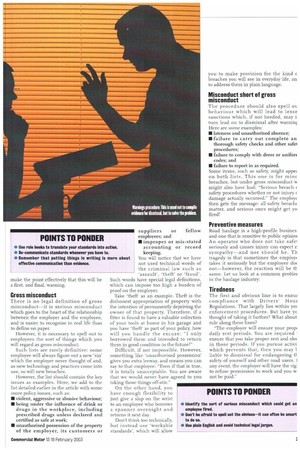Gross misconduct
Page 25

If you've noticed an error in this article please click here to report it so we can fix it.
There is no legal definition of gross misconduct—it is serious misconduct which goes to the heart of the relationship between the employer and the employee, and is easier to recognise in real life than to define on paper.
However, it is necessary to spell out to employees the sort of things which you will regard as gross misconduct.
Such lists are rarely definitive: some employee will always figure out a new 'sin' which the employer never thought of and, as new technology and practices come into use, so will new breaches.
However, the list should contain the key issues as examples. Here, we add to the list detailed earlier in the article with some more policy issues, such as: • violent, aggressive or abusive behaviour; • being under the influence of drink or drugs in the workplace, including prescribed drugs unless declared and certified as safe at work; • unauthorised possession of the property of the employer, its customers or suppliers or fellow employees; and • improper or mis-stated accounting or record keeping.
You will notice that we have not used technical words of the criminal law such as 'assault', 'theft' or 'fraud'. Such words have special legal definitions, which can impose too high a burden of proof on the employer.
Take 'theft' as an example. Theft is the dishonest appropriation of property with the intention of permanently depriving the owner of that property. Therefore, if a fitter is found to have a valuable collection of your tools at home in his garage and you have 'theft' as part of your policy, how will you handle the excuse: -I only borrowed them and intended to return them in good condition in the future?"
Difficult, if not impossible. However, something like 'unauthorised possession' gives you extra leeway, and means you can say to that employee: "Even if that is true, it is totally unacceptable. You are aware that we would never have agreed to you taking those things off-site."
On the other hand, you have enough flexibility to just give a slap on the wrist to an employee who borrows a spanner overnight and returns it next day.
Don't think too technically, but instead use 'workable standards', which will allow you to make provision for the kind c breaches you will see in everyday life, an to address them in plain language.




































































































































































